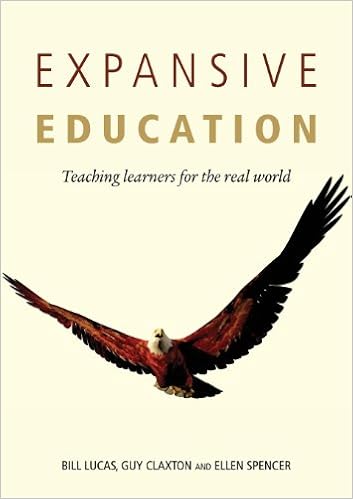Things that resonated with me:
- People have a deeper need to be successful - to do this they need a rich set of habits of mind to stand them in whatever destiny they find themselves in.
- Despite many claims, levels of literacy haven't changed much from 1950s to 2007 (Presumably this is UK based, but likely reflective worldwide). Rather, the statistics show that teachers are just getting better at teaching to the test.
- The pleasure in reading has dropped considerably - in the pursuit of 'higher standards'.
- Reading for pleasure outweighs every social advantage, including parents income, in the future success of children.
- A child's perception: 'The people who write textbooks do not make mistakes, and the best way to learn is by your own mistakes.' (Jennifer, fifteen)
- Being a powerful learner is not the same as being a good student.
- Conventional education is an experiment too (as well as 'new' ILE education) - one which we have good reason to question. Inaction is not an option.
- Why should intelligence be related to the 3 Rs? What if other kinds of knowledge and expertise were more prestigious? What if English and Mathematics were reduced to one hour a week (like PE and the Arts) and became optional in later education? Children who are naturally 'bookish' are disadvantaged by the lack of fit for their strengths and interests (and those that the school clearly values).
- Possessing skills and abilities cannot be assessed by a tick box. How can a teacher observe it once and know that that child can apply that skill in a variety of contexts, for various purposes and on various days?
- Unmotivated children don't exist. This is a belief by people who actually mean: 'They don't want to learn what I want them to learn, when I want them to learn it, in the way I want them to learn it.'
- Learning at school often lacks a sense of timing.
- 3Rs - responsibility, respect and 'real'. 3Cs - choice, challenge and collaboration
- Toddlers have built in learning amplifiers - practice and play. Practice makes perfect, and the disposition to practice seems to be built in to their brains.
- Learning is learnable and teachable.
- Good learners can be awkward and inconvenient - but the teacher not having having enough time should not result in learning being inhibited.
- Teachers need to be willing to grow and learn. Would you want a surgeon to operate on you who had not opened a book or researched since he graduated 30 years ago?
- Every little detail of the way a lesson is delivered, or a school organised, is a carrier of values and beliefs.
- Magnificent Eight qualities: curious, courage, exploration/investigation, experimentation, imagination, reason/discipline, sociability, reflective.
- Performance indicators in fitness are your 'personal bests' - i.e. running a kilometre in less time than before, or lifting a heavier weight. Measuring learning power should be the same - comparing yourself with yourself.
- Just as it takes time to build strength, it also takes time to build learning power.
- A learning power coach (teacher/mentor) should give feedback that is useful and precise.
- Try giving children the job of nominating each other for awards such as star persister, questioner or collaborator of the week.
- Teachers should be required to be visible engaged in some project that stretches their own subject knowledge and share that process and progress with the children. Model.
- Teachers should regularly say 'let me try this on you' and 'tell me how it goes'. Seek feedback from the students.
- Sometimes we have to restrain our enthusiasm to teach as children operate best on a 'just in time' basis. They are very good at learning what they need to know in the moment, in order to get on with a project.
- Imagination is the child of boredom, so allowing a child to discover that being bored isn't so bad, to tolerate the quiet times, and to learn to use their own imagination to 'rescue' themselves from boredom, is a useful regime for your child.
Some deeper thoughts:
A life of cheating
According to Claxton's sources, cheating is rife in secondary and tertiary education now. And part of me says - not a surprise! He also refers to the fact that most students (I, myself can identify with this) will forget the content of their exam within a reasonably short space of time. Can you remember what was in your school or tertiary exams? So what is the point of these closed book tests - especially now when we are in a Google Age and content is free everywhere. Should these education systems be thinking about assessing ability to access and synthesis information, question it and identify errors and possible errors? Are they too thinking about the point of school?
The word 'work'
I've had an issue with the word 'work' in the classroom for a while. Claxton sums it up succinctly: "The language of work continually reinforces the idea of learning as drudgery". Talking about learning to the children is much better and causes engagement and activeness in learning. Instead of "get on with your work", try:
- How are you going to go about that?
- What is hard about that?
- How are different groups going about that?
- How else could you do it?
- What could you do to help yourself if you get stuck?
- How could you help someone else learn that?
- What are the tricky parts?








